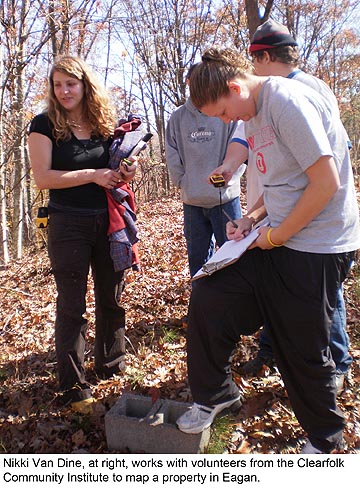 Three Tusculum College students recently received a crash course in coal mining and its effects on communities and the environment when they were immersed in service to a small community in East Tennessee near the Kentucky border.
Three Tusculum College students recently received a crash course in coal mining and its effects on communities and the environment when they were immersed in service to a small community in East Tennessee near the Kentucky border.
Joshua Folks of Greeneville, Shamale Lee of Burnsville, N.C., and Nikki Van Dine of Columbus, Ohio, traveled with Robin Fife, assistant professor of social science, to Eagan where they worked with the Clearfolk Community Institute as part of a Service-Learning Immersion course. The Clearfolk Community Institute is dedicated to improving the lives of those living in Eagan and to empowering the community’s youth to gain the education they need to lead successful lives.
In Eagan, Fife said, the group found a community that faces both economic and environmental challenges from coal mining. While underground mining had been conducted in the past, coal companies are now involved in mountaintop removal mining in the area around Eagan, which requires less manpower than underground mining. As its name implies, the top of a mountain is blown up in this method of mining to expose the valuable mineral for removal with the remaining earthen material placed in a valley or hollow. The mining has caused such problems for the residents of Eagan as loss of water purity.
Absentee landowners or coal companies own the majority of the land in the community and do not pay local taxes, so there are limited funds to provide services such as adequate road paving or garbage pick-up, she continued. “People struggle to eke out a living and find education.”
Teamwork was one of the lessons of the trip, Lee said as the students worked with Clearfolk Community Institute volunteers, called VIPs (Volunteers in Partnership) by the organization. “I was impressed by the teamwork,” he said. “We melded together well.”
One of the primary projects of the students was helping in a project to map the community. No map exists showing property lines for the Eagan area, and the Clearfolk Community Institute is trying to complete one on its own. The students used Geographical Information System units to map properties in the community.
“We measured using a landmark of importance (to the residents),” said Van Dine. “Some had a nice garden or a tree they had planted a long time ago. What we did will provide a building block for future VIPs.”
In addition to the mapping, the students provided a variety of service to the residents. “We swept leaves, cut trees and fixed a chicken coup,” said Foulks. “We cooked greens for a community dinner. It was a real experience.
“We did anything we could to help them out.”
As they provided service, the students had the opportunity to learn the personal stories of the residents and how their lives have been impacted by the coal mining industry. Foulks told of an older couple they students helped who needed assistance with some of their outdoor chores because the husband was in poor health due to his days as a coal miner. “It was horrible thing to see what they went through,” he said. “Now, they don’t have anything. They don’t have health insurance.”
The students learned about the coal-mining industry in depth, about pollution and environmental issues related to the removal of natural habitat by mountaintop removal mining and about the herbs that the residents in the community grow and use for medicinal purposes. Although most of the roads leading to the mining activities are on private property, there was a public road near one of the areas where mountaintop removal had been done to allow the students to see what the effects are on the landscape.
After the students returned to campus, they prepared policy papers about issues that they found that interested them from the service experience. Foulks focused on cap and trade issues related to acid rain and federal regulation of emissions. Lee wrote about land ownership issues. Van Dine’s paper was about the regulation of ginseng, one of the herbs grown in the region that could provide a source of income for Eagan residents.
The students also proposed ways that the situation in Eagan could be improved, including increasing publicity about top mountain removal mining and its effects, getting more communities involved, continuing to investigate and invest in other energy sources such as geothermal, solar or wind power, and encouraging people to write to their Congressmen about the issue.
As they returned to campus, the students have also worked to open doors to allow one of the youth they met and worked with in Eagan to attend Tusculum.


